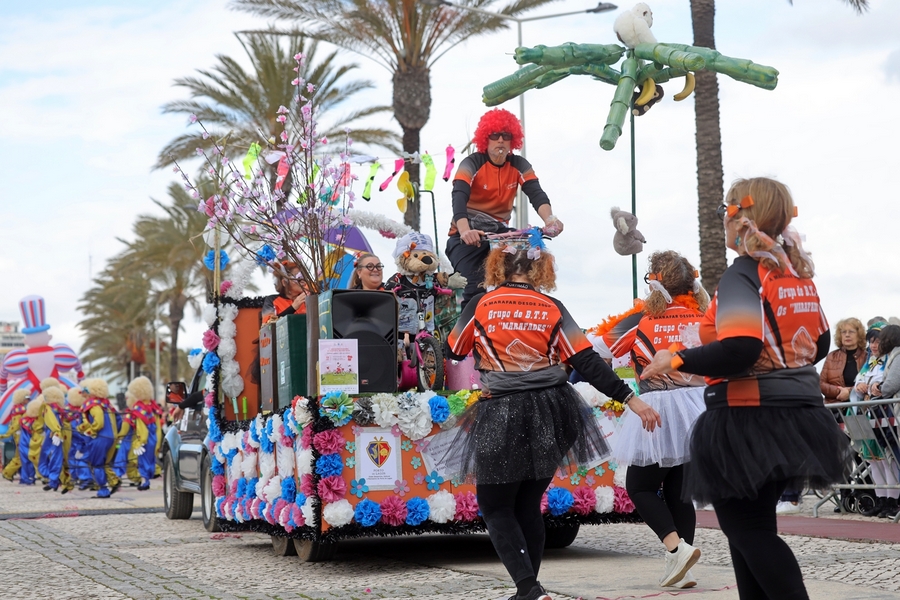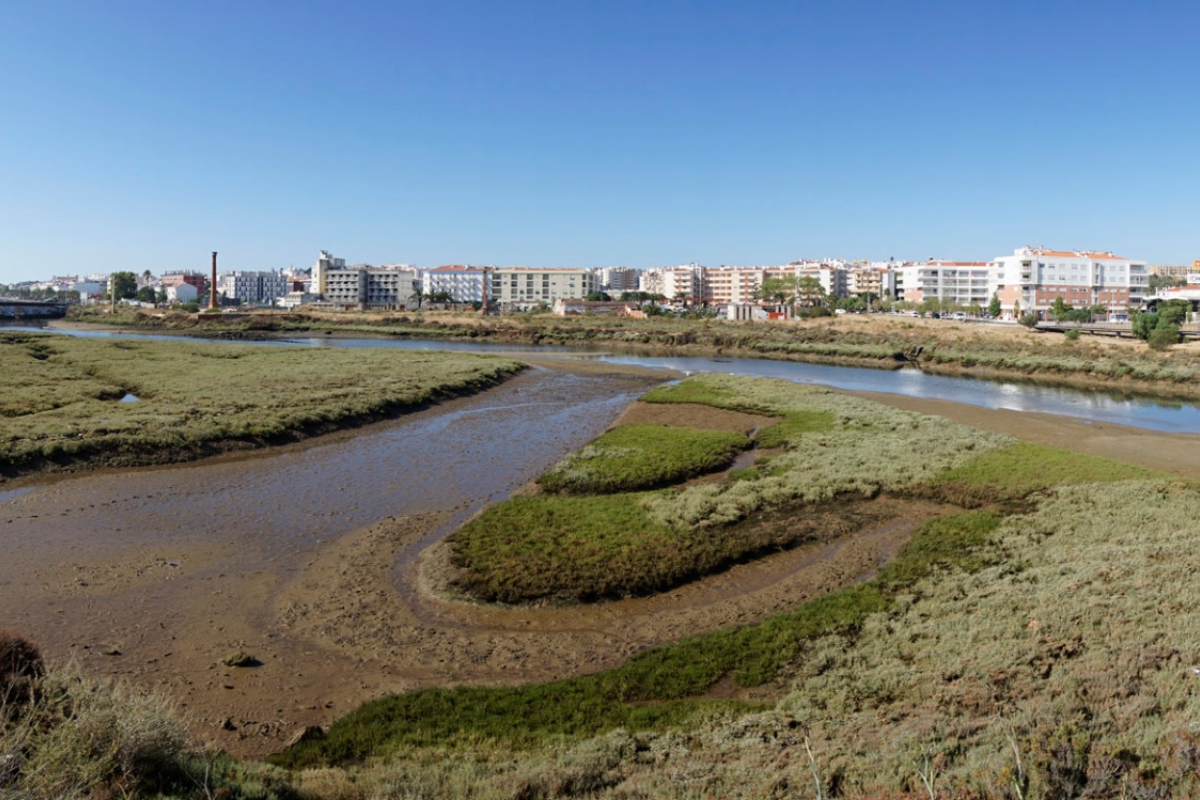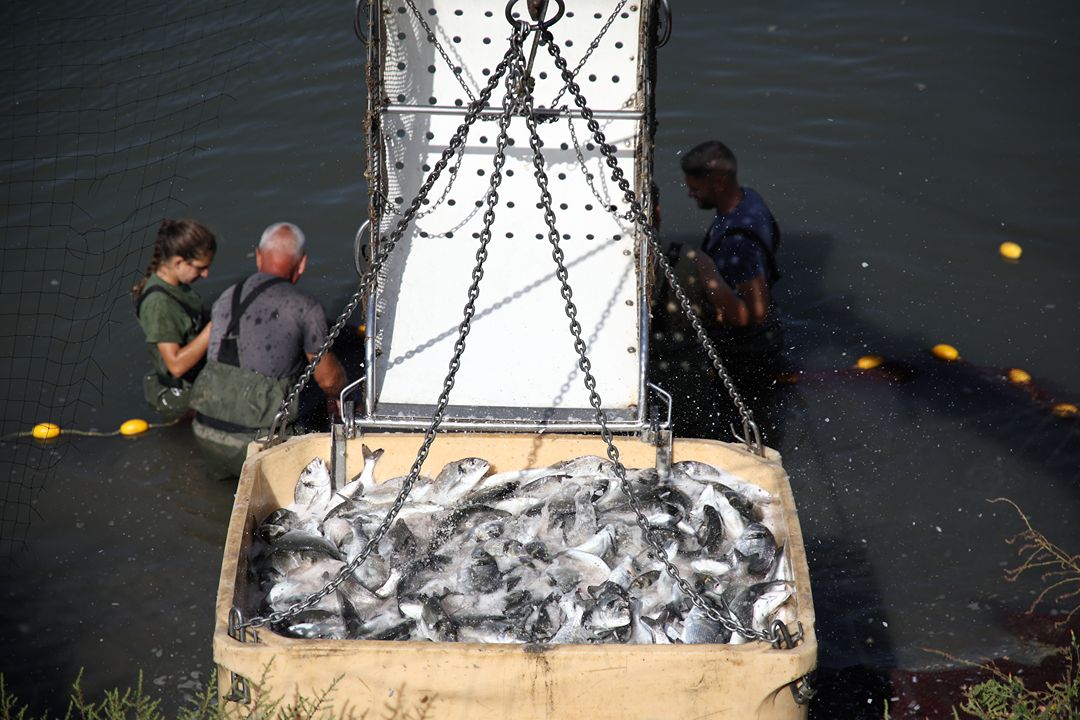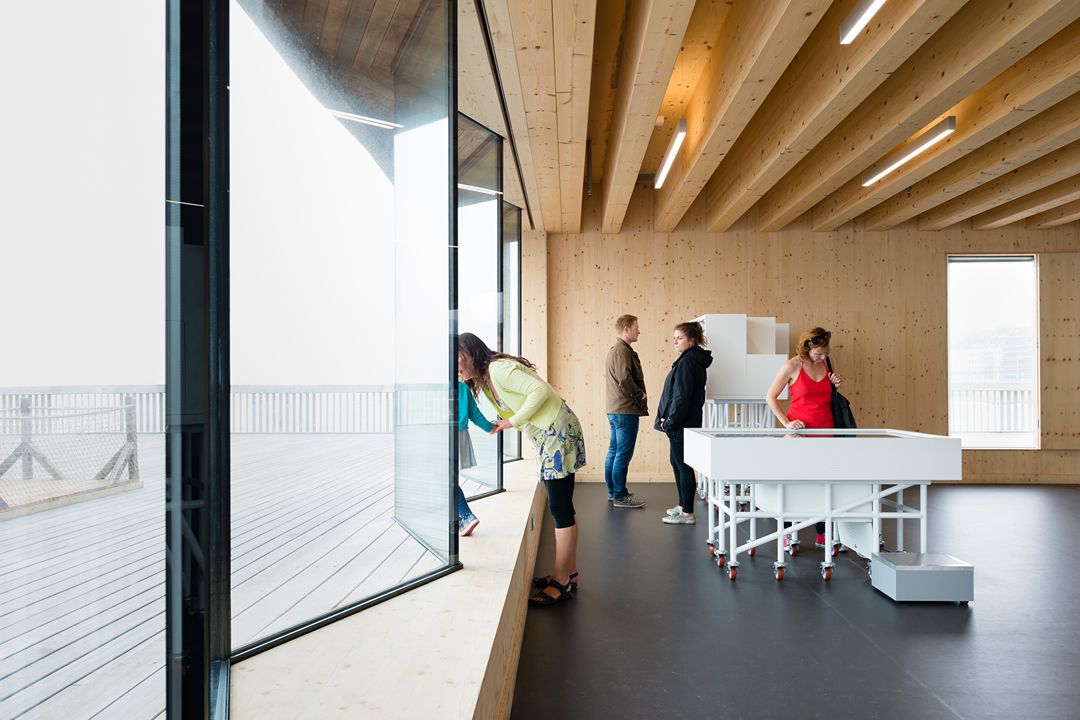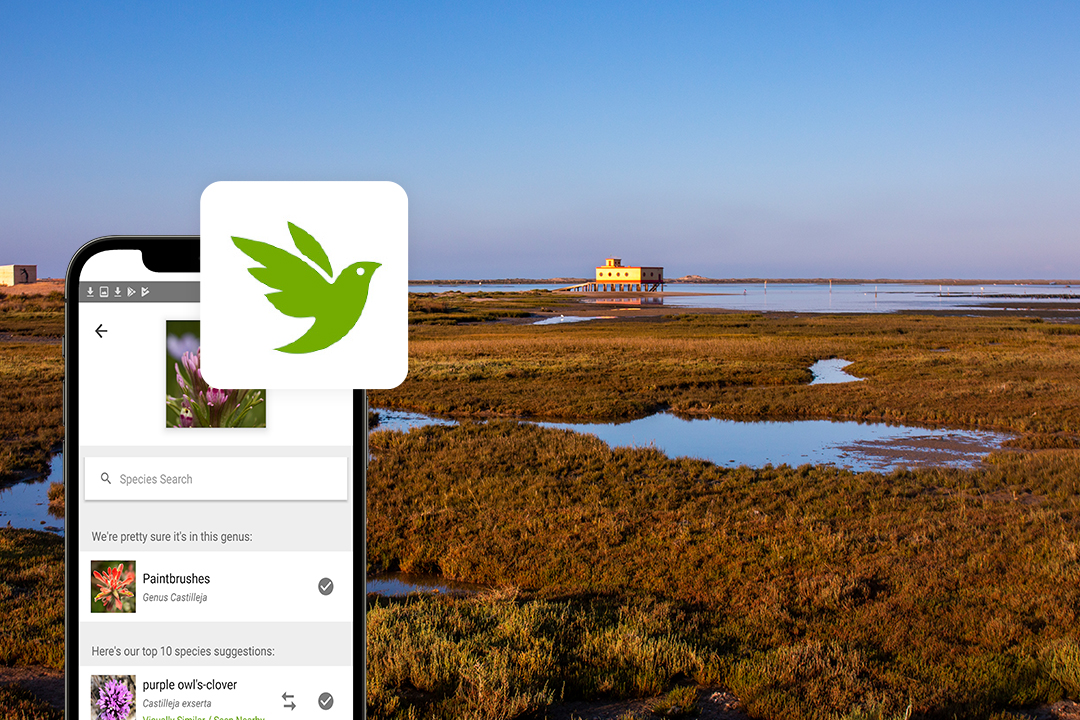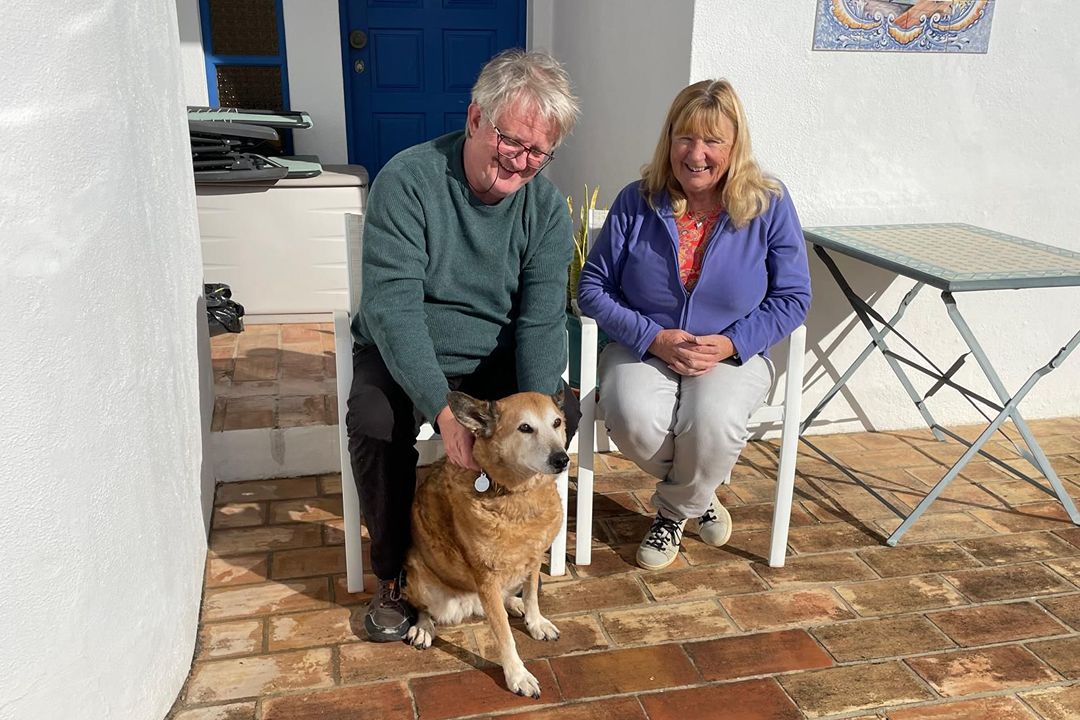When I arrive at the Tivoli to meet the British Ambassador to Portugal, the atmosphere feels very surreal. As I walk down the street, soldiers dressed in camouflage and carrying guns march alongside me. Turning onto the Tivoli’s access road, every single car is a Mercedes with a country flag flying mounted on its bonnet. The tourists who usually frequent this hotel in June are looking confused as the foyer is filled with serious-looking men and women in suits.
It is the day before Dia do Portugal and Lagos has the honour of hosting the event this year. Ambassador Lisa Bandari is just one of many dignitaries invited to celebrate alongside President Marcelo Rebelo de Sousa.

An ambassador‘s reception
I confess to feeling slightly nervous at meeting a person of such gravitas, but then the ambassador arrives in the foyer and ushers her two young children away so we can chat. “Hi, I’m Lisa,” she says. I am immediately at ease. In a smart trouser suit and apologetic for being late, she immediately comes across as incredibly accessible, down-to-earth, and definitely not cut out of the normal diplomatic mould.
I ask her how long she has to talk, and she generously gives me 35 minutes before, as she says, “I have to put on a frock.” Along with many of the other diplomatic corps and heads of mission, she has been invited to meet with the President.
“Each diplomat has a couple of minutes to greet the president and convey our best wishes for the Dia de Portugal,” she explains. “And then there’s a dinner event tonight. Tomorrow morning will be the military parade that we’ve been invited to watch, followed by a lunch, hosted by the câmera.”
Images of the President in Lagos have been popping up on my feed all day, as excited locals have been posting photos of themselves with de Sousa (who is known to love a selfie). I ask the ambassador about her experiences with the popular head of state and known Anglophile! “I presented my credentials to him when I started my job in January last year. And then I’ve met him on several occasions since then. He loves Britain. He remembers both of the Queen’s state visits to Portugal, and then he met her in the United Kingdom. So he has very warm memories of her.”
Are there any plans for King Charles to visit Lisbon? “Not that I’m aware of, but we would obviously love that.”
An impressive resumé
I have briefly reviewed the ambassador’s résumé, and it includes some challenging roles and diverse postings, so I am keen to ask her about how someone so young achieved this highly sought-after position. “My route into the Diplomatic Service was through studying languages at university.” The ambassador studied French and German at the University of Oxford. “I spent 10 months living in Germany and I loved it. And I think that’s where I got the idea of learning languages and living abroad. Every day felt a bit like an adventure. And that was probably the start of my interest in that kind of international career.”
Becoming an ambassador is a competitive process that involves submitting a paper application, participating in an interview with a panel, and completing a written assessment. Although the ambassador began her role on 15 January 2024, for family reasons, she moved to Portugal in 2022, along with her husband, two children and their black Labrador, Lily.
I wonder how, as a linguist, she is progressing with learning the notoriously difficult language of Portuguese. “Well, I learned it in 2023 before I started the job. So, I try to use it as much as I can now. And as a linguist, it’s a brilliant opportunity to be supported in learning another language. I’ve already learned Farsi with the Foreign Office and now Portuguese.”
Before becoming an ambassador, Lisa Bandari served as Director of Policy at the Aga Khan Foundation in Afghanistan and as Head of the Internal Political Section at the British Embassy in Kabul. “I was in Afghanistan from 2008 to 2011. And I thoroughly enjoyed it. It was a time of optimism in a beautiful country with beautiful people. We felt like we were making a difference working on supporting the elections in Afghanistan. I think about it a lot; it’s very sad what’s happened now. But I hope there are better days ahead.”
Before this posting, Ms Bandari was the FCDO Deputy Director for India and HMG India Coordinator. “I was based in London but working on India, which is a fascinating country. We had a very ambitious plan with them, working on a 2030 roadmap that covered everything from science to defence cooperation to trade. We also negotiated a free trade agreement, which we delivered. For me, it was exciting because my father is from India, so I’ve always had that interest in South Asia because of my family background.” The Ambassador’s father was from Mumbai and emigrated to the UK, which is where she grew up.
I am also interested to see that from 2005 to 2006 the ambassador worked at the Home Office as Head of the UK Government forced marriage unit, which I imagine would also be a very rewarding role. “Yes, it’s part of our consular work to support British nationals. Unfortunately, every year, there are people in the UK who are forced into marriage, often while abroad. I headed up a joint unit with the Foreign Office to support British victims, both women and men. We supported them in coming back to the UK and rebuilding their lives after those experiences. We would also work in a preventative capacity, liaising with the police, social services and schools. So, it was one of the most meaningful jobs I’ve done, because it felt like we were making a huge difference to people who really needed us. And it was an innovative model that we used, which we’ve since shared with other countries that are now doing more in this area.”
Britain and the EU
In a role that I suggest was not so rewarding, Ms Bandari worked for the Department for Exiting the EU as Deputy Director for Ongoing EU Business and Third Country Preparation. The ambassador disagrees, “For me, it was absolutely fascinating. I wanted to do something that felt important and I felt that was something really vital for the country to get right. I was involved in preparations for the negotiations and participated in some of the initial rounds of negotiations on the withdrawal agreement. It was an interesting experience of a multilateral negotiation, which I really enjoyed.”
I try to draw Ambassador Bandari as to whether, in hindsight, she thinks Brexit was right to exit the EU, but with true diplomatic aplomb, she skirts around the question. “I think now, it’s nice to see that we’re in this phase of our relationship with the EU, where we’ve just negotiated a UK-EU summit and a strategic partnership, which is forward-looking, bringing benefits for British people and for EU citizens, including here in Portugal. It was advantageous to be involved in those initial negotiations, and now, as the British Ambassador to Portugal, I see how the relationship has evolved. We are now working much more closely together on everything from food and agriculture to trade, energy, security, and defence. The security and defence partnership we’ve also just agreed last month will also see us working much more closely with Portugal as well as other countries.”

The Anglo-Portuguese alliance
I ask Ms Bandari how her job is made easier by the strong friendship between England and Portugal. “Yes, it´s the oldest diplomatic alliance still in existence in the world, and that’s really special. It’s such an honour, and I’m deeply aware of the weight of history and the friendship that we’ve always shared as our countries. I think we need to respect that history, but also consider what the modern chapter we’re creating now looks like. And I think part of that is our bilateral relationship, but it’s also what we do with Portugal as an EU member state. This gives us the framework to work closely together, on everything from security, to defence and trade.”
Reflecting on the display of Portuguese military strength in Lagos, it is an interesting fact that the British military works closely with the Portuguese military on a variety of projects. “We’re both founding NATO member states, so we’ve always had that link since 1949 within NATO. And now we have it within the framework of the new partnership with the EU as well. “
The importance that Ambassador Bandari places on the NATO friendship was exemplified in June, when she hosted Model NATO, an event for university students that simulates the workings of NATO. It was attended by students from Birmingham University as well as Portuguese students from six different universities.
“We had a panel discussion, which I was involved in. The students then played the role of NATO, comprising 32 NATO members, for two days. The idea behind this is partly to introduce them to the world of international diplomacy and hopefully, some of them will be interested in a career. It also aims to raise awareness of the five NATO institutions in Portugal and the importance of NATO for the safety and security of all Europeans.”
In Portugal, NATO is represented through the JALLC (Joint Analysis and Lessons Learned Centre, located in Lisbon) and the command of STRIKFORNATO (Naval Striking and Support Forces NATO, located in Oeiras).
Defence and security
I ask the ambassador if she gets the impression that NATO has suddenly become more relevant in diplomatic circles. “I think our Prime Minister, Sir Keir Starmer, put it well when he said that we’re facing a kind of once-in-a-generation security challenge on our continent. With Russia’s illegal invasion of Ukraine, we all need to consider how we can work more closely with security and defence. The UK government has done that with our pledge to increase defence spending. The Portuguese government is moving in the same direction. At this time of global turbulence and uncertainty, you need to be working with your friends and allies.”
I suggest to the ambassador that this is one of the greatest challenges in her role at the moment. “Yes, I think the context we’re in feels volatile, and I think that is where, as a diplomat, you think about your friendships, where are your alliances, who do we need to work with. And Portugal is our oldest ally. We are two Atlantic powers who have always shared a common worldview. We now share common values as two modern democracies. We need to work together.”
Ambassador Bandari is keen to point out that Portugal has done a huge amount in supporting Ukraine, as has the United Kingdom. Last year, Portugal donated 52 million euros to a fund co-led by the United Kingdom for drones to be used in Ukraine. “It’s an excellent, practical example of a generous contribution to a crucial effort that’s directly helping Ukraine in its struggle.”

Women in the diplomatic corps
I would like to know if there are any additional hurdles to overcome as a woman in the foreign service. “Actually, there are a huge number of female ambassadors in Lisbon. I’d say most European ambassadors here, or certainly EU ambassadors, are women. There is also a fantastic network among ourselves, which provides a great deal of solidarity and support. I run a programme called Ambassador for a Day, which we started last year, where we invite 10 inspiring young women between the ages of 16 and 18 to spend the day with me while learning about a career in diplomacy and international relations.”
The embassy received over 250 applications for 10 available places. The selected few spent the day in the Foreign Ministry in Portugal, and then at the embassy, learning about life as a diplomat. Ambassador Bandari invited female ambassadorial colleagues from every continent, including Mozambique, Australia, Canada, and Europe, to join them for lunch. Each of the young ladies had speed mentoring sessions with their seniors to learn more about a career in the foreign service.
So while the ambassador thinks that the number of women in the role reflects an acceptance of women’s aptitude for the role, she points out, “I think still it’s fair to say that when I walk into a room, I’m not everyone’s idea of what the British ambassador looks like. So, I think we still have a job as women to challenge those historical expectations. However, I hope to demonstrate that there are many different individuals and approaches to performing this role. And I hope that, in other ways, I’m able to connect with audiences that other people might not be able to, and thereby widen the reach of what we’re doing in diplomacy.”
I point out to her that women’s ability to multitask and be great communicators may be the ideal skill set to apply to an ambassador’s role.
“I think you need empathy,” she agrees. “Being able to understand how other people think and feel is crucial to diplomacy and being an effective ambassador. I believe that a basic curiosity and interest in other cultures and countries are also essential. And then I think there’s also an element of resilience when you’re in hostile environments, and separated from your family and your support networks. You need to be somebody who can be comfortable and manage that. It’s not a job for everyone, but for me it is an amazing lifestyle of adventures.”
I ask her how she manages to balance her diplomatic role with being a mother. “There is certainly a lot of planning and organisation that goes into our daily lives. I travel extensively throughout Portugal and serve as the non-resident ambassador to Cape Verde, so I need to visit at least once or twice a year. However, we’re very fortunate to have a strong support network. I think like any working parent, you need to sort of prioritise and manage your time well to do both, to be a parent and to do your job.”
But the ambassador is well aware of the benefits of living in Portugal at this informative time in her children’s childhood, “ I think it’s a real privilege for children to be able to move countries and learn different languages. They both speak Portuguese fluently, so I feel like I’m giving them a real gift. I think one of the things my husband and I have appreciated most about the culture is its welcoming nature towards children. In public spaces, in restaurants, you never feel that they’re an imposition. And we’ve been grateful. It’s a lovely place to raise children.”
The darker side of Portugal
Of course, just like every country, Portugal does have its dark side, and at the time of my interview with the ambassador, Portugal had hit the headlines in the UK for the wrong reasons.
The first being another search for Madeleine McCann, with German and Portuguese police searching for fresh evidence in the Atalaia area of Lagos. I ask the ambassador how she is dealing with this situation.
“At the embassy, we continue to follow the case closely. And we’ve provided consular assistance to the family over the years. We do continue to liaise with the Portuguese government and authorities as appropriate. But it’s not something we comment on in detail out of respect for the family and their privacy. I would, however, like to say that we continue to encourage anyone with relevant information relating to her disappearance to approach their local authorities.”
I then asked the ambassador about the heart-wrenching case of Greg Monks, who went missing while on holiday in Albufeira and whose body was subsequently found at the bottom of a ravine. “We have been supporting the family of a British man who died in Portugal while working closely with the local authorities. That’s true for all cases of British nationals who go missing.”
This case has prompted a number of negative tabloid reports on the rather unsavoury side of the nightlife in Albufeira and I ask her if she feels that the unsocial and loutish behaviour of British tourists is something we need to deal with.
“Before I came here, I was actually with our vice consulate in Portimão, talking about how we can work more closely with the local authorities on this. We’re eager to explore how we can support them in improving this situation. I know Albufeira is planning to implement a code of conduct, so we will be helping them with that. And I think it’s in all of our interests that British visitors here stay safe and well. So we’re very keen to do anything we can to make sure that people who come for a holiday have a really positive experience.”
The FCDO runs various campaigns to ensure that, before tourists come on holiday, they receive messages about potential dangers to be aware of when visiting, such as being cautious about their drinks in bars. “We have a lot of consular advice on how to stay safe when on holiday. I would encourage everyone to check our travel advice for people travelling to Portugal. We also conduct consular campaigns, such as ‘Stick With Your Mates’, which aims to encourage people to adopt safe behaviours and prevent them from coming to harm.”
Reducing queues at passport control
Following the continued negative publicity surrounding the long queues for British nationals at airports, I ask the ambassador why the Portuguese Immigration authorities can´t seem to sort this problem, which is hurting tourism and Anglo-Portuguese relations.
“We’ve been working with the Portuguese authorities to make sure that British visitors can use the e-gates. And as of 4 June, they are open to British visitors to Portugal at Faro Airport. This move is already easing queues and making it easier for both arriving and departing passengers. In Lisbon, we’re aware that there has been some software upgrading, which is causing some disruption at the moment. But our understanding is that this is a temporary issue and should be resolved within a couple of weeks. As you may know, British nationals have always been able to use the e-gates at Lisbon Airport.”

The youth experience scheme
I am keen to obtain more information about the new youth experience scheme, which the UK and EU are collaborating on, that would enable more young British residents to work, study, volunteer, or simply travel in Portugal for a limited period.
“The details are still to be worked out, and need to be agreed with the EU by the central UK government,” the ambassador comments. “But when it happens, our embassy will certainly work very closely with the Portuguese authorities to facilitate this scheme. One of the real strengths of our relationship is the deep, people-to-people ties. We have a community of about 40,000 British nationals here in Portugal and there are over 400,000 Portuguese living in the UK, which is a huge strength in our relationship. And as the British Ambassador, I want to maximise the opportunities for young Portuguese people to have that experience of living and working in the UK and young British people to be able to come and experience Portugal.”
AIMA and visas
Our time slot is coming to an end, and I am eager to address another pressing issue among British expats: the challenges of obtaining visas to reside in Portugal, which has a significant backlog. The Agency for Integration, Migration, and Asylum (AIMA) has taken over from SEF, and many are reporting that people are queuing overnight to get an appointment before their visa expires.
The ambassador is aware of the problem. “So, one thing I would say is there is a form that you can fill out on the AIMA website. If people need to wait for an appointment, renew their existing card, or permit, they should fill out the form and send it to this email address. geral@aima.gov.pt
For those living in the UK who wish to move to Portugal, the process involves applying for an appointment in the UK, which is run by the VFS service.
“We work really closely with Portuguese ministers and with senior officials in AIMA and we’re looking to see how we can resolve issues. I know that the Portuguese government is working diligently to clear the backlog of cases. We’re in regular contact with them to monitor the progress of this process and ensure that the backlog is cleared and expedited. We also continue to talk about issues, including, for example, those renewing their biometric cards.”
Portuguese culture
The ambassador and her family are enjoying the high quality of life Portugal offers. “The climate means you can be outside most of the year. One of the things I have loved is the idea of being able to visit the woods or the beach all year round and simply enjoy nature and being outdoors. I think it’s a huge strength of life here. Additionally, the emphasis is on healthy, unprocessed, and natural food, such as a lovely grilled fish accompanied by fresh vegetables. I believe that the Portuguese diet shares similarities with the Mediterranean diet. It’s so good for you. And in an age of ultra-processed food, I think it’s even more appreciated being in a country where you can just access fresh food.”
The ambassador is also fascinated by Portuguese history and how it links to British history. “On some of our holidays, we’ve taken the opportunity to explore a little bit. We took a road trip last summer, visiting several cities, including Batalha, to see the tomb of Philippa of Lancaster and João I, where they are depicted holding hands in stone. I thought that was just really special. And then we visited Busaco to see an important site where the Duke of Wellington had his victory in the Napoleonic Wars.”
Legacy
An ambassador’s posting is just four years, so I ask Ms Bandari what she thinks she can achieve in this relatively short time. “I think there’s a real moment of focus in both our countries on economic growth and a really important part of my job is supporting British businesses, who want to trade with Portugal. There are really strong links between our businesses, which go back nearly seven centuries, and I want to make sure that they carry on during my time.”
A prime example is the Portuguese company TEKEVER, now a ‘unicorn’ valued at over £1 billion, which has announced a £400 million investment in the UK over the next five years. This investment, part of a new funding round, aims to accelerate innovation, grow sovereign defence capabilities, and create over 1,000 high-skilled jobs in the UK.
Several large solar farms are being established and operated by British firms in the Algarve, alongside significant and productive Portuguese investment in the UK in areas such as renewable energy, offshore wind, and technology.
“Energy and climate is another huge area where Portugal and the UK can work together with our focus on renewable energy, including our private sector collaboration, but also in policy terms, we’re like-minded and we’ll be working closely together for COP 30 in Brazil. It will be a big focus,” says the ambassador.
On a personal level, Ambassador Bandari will also continue to support young women in pursuing international careers through the Ambassador for a Day initiative and other similar programs. “There’s a huge benefit to all of us if we have a more diversified set of international diplomats. Here in Portugal, we have a huge talent pool that we can nurture.”
The ambassador concludes, “I would like to contribute to a modern 21st-century relationship between the two allies that will act as a firm foundation for decades to come.”
I ask her if she knows what her next role will be. “It would be lovely to have another ambassadorial role, but on the other hand, I love living in Portugal. So we will see.”

Soup and pigeons!
As I look at my clock, I realise my time is up and as we round off the conversation, we laugh a bit about how the ambassador was surprised by one thing about the Portuguese culture – the prevalence of soup! “In the UK, we think of soup as a kind of winter food, so the idea that you have it with every meal was new to me. My children have it with every school lunch, even in the summer. When she first started at a Portuguese nursery, my daughter would have soup with all the other two-year-olds every day. As a British parent, the idea of giving a bowl of soup to pre-school children and seeing what happens is a surprise. But I think it’s wonderful!”
I laugh at this, as I had a similar experience with my children. We discuss for a moment the big bibs and how they learn early on the dexterity of using spoons and bowls. I suddenly feel like we are two mothers having a chat.
The ambassador then slightly floored me when she mentioned that she had read Tomorrow, and thought it had great value as it informed English speakers about the events, culture, and history of the Algarve. If I had started to like this impressive lady during our chat, I was now a fully signed-up member of her fan club! I mentioned how interesting my job was, as I had interviewed some pigeon fanciers from Odiáxere the previous month, and I was now chatting with the British ambassador. She agreed that my article on pigeon racing was interesting.
Lisa Bandari is one class act. Friendly, approachable, articulate, intelligent, incredibly well-researched and a Tomorrow reader! I tried to beat a dignified retreat as the ambassador rushed off to put on her frock, while quickly stopping to greet another ambassador who was also sitting in the foyer.
I left the Tivoli, walking past the rows of diplomatic cars, high on having met the British ambassador to Portugal, having managed to cover such a diverse range of subjects in 35 minutes, and knowing that she had read my pigeon article!
www.facebook.com/BritsInPortugal
www.gov.uk/world/organisations/british-embassy-lisbon
www.gov.uk/guidance/living-in-portugal
www.gov.uk/foreign-travel-advice/portugal
www.gov.uk/government/collections/support-for-british-nationals-abroad

